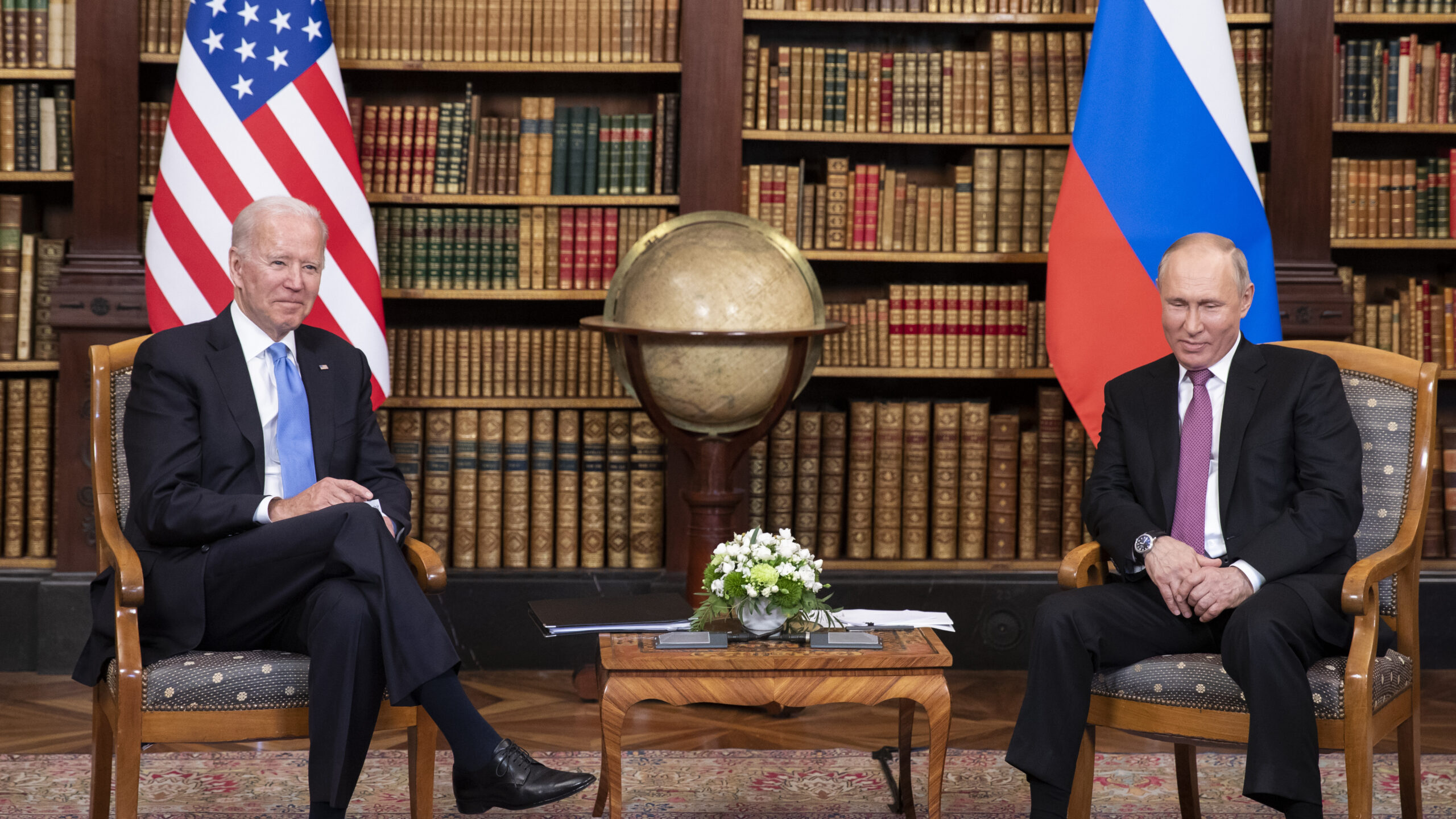
U.S. president Joe Biden (L) and Russian President Vladimir Putin meet during the U.S.-Russia summit at Villa La Grange on June 16, 2021 in Geneva, Switzerland. (Photo by Peter Klaunzer – Pool/Keystone via Getty Images)
As diplomats from the US and Russia traded barbs in the United Nation Security Council today, the fact the meeting is taking place at all means there’s a sliver of hope that diplomacy stands a chance in the current Ukrainian crisis. But should negotiations move forward, AEI’s John D. Maurer argues in the op ed below that the US shouldn’t bend when it comes to one particularly acute issue: arms control in Europe.
Russia’s military buildup along Ukraine’s borders has put a global spotlight on the ongoing political and military tensions simmering in Eastern Europe. While most attention has focused on the potential for another Russian invasion of Ukraine, the crisis has also renewed the discussion around the future US-Russian arms control.
Indeed, the Putin regime has listed renewed limitation of intermediate-range missiles as one of its demands to defuse the crisis. Analysts have suggested that compromising on the deployment of intermediate-range missiles might offer a peaceful way out of the crisis, and there is some indication that the Biden administration is thinking along the same lines.
While limiting land-based intermediate-range missiles remains a long-term US interest, pursuing a rapid settlement in the face of Russian coercion would be a mistake. Rather than capitulate to Russian threats, the Biden administration should redouble efforts to deploy American intermediate-range capabilities. Such deployments would better set the stage for a genuine arms bargain in the future.
Russia’s case for the rapid limitation of intermediate-range missiles rests on a superficial reading of the military-political situation in Eastern Europe. Among its laundry list of demands, the Putin regime contends that American preparations to deploy land-based intermediate-range missiles to Europe pose an intolerable threat to Russian security. These missiles, which can strike targets at ranges from 500 to 5,500 km, would theoretically allow American forces in Europe to launch strikes into Russian territory in the event of a war. The Kremlin argues that, by forgoing such missile deployments, the United States could reassure Russia of NATO’s defensive intentions.
Yet there are significant difficulties in establishing immediate limits on intermediate-range missiles with Russia. First and foremost, the supposed crisis of American missile deployments in Europe is a problem of Russia’s own making. Until three years ago, Russia already had ironclad guarantees that the United States would not deploy such missiles in Europe (or anywhere else) via the 1987 Intermediate-Range Nuclear Forces (INF) Treaty.
RELATED: Beyond INF: An affordable arsenal of long-range missiles?
The Putin regime foolishly torpedoed this arrangement by testing and deploying prohibited weapons of its own, perhaps in the hope that American leaders would not respond. Only after the United States withdrew from the Treaty in 2019 has the Putin regime belatedly seemed to realize its value to Russian security. The demonstrated willingness of the Putin regime to cheat on its arms control commitments means that any future agreement will require significant verification provisions to ensure that Putin does not simply cheat again.
Just as Putin’s arms control malfeasance poses a challenge to limiting missiles, so too does his ongoing gaslighting of American diplomats. The Putin regime continues to insist that it has no intermediate-range capability, and blames the United States for the INF Treaty’s end. Years later, Russian diplomats maintain this charade by suggesting that they might deploy intermediate-range weapons in the future if the United States does not agree to limit its own weapons.
We should not mince words: Russia’s missile diplomacy is built on a lie. The fact is that Russia already deploys its own intermediate-range missiles — the very same weapons that led the United States to withdraw from the previous INF agreement. Putin’s unwillingness to admit his transgression places the United States in an awkward position.
If the Biden administration negotiated on Putin’s terms, it would also endorse the fiction that Russia’s intermediate-range missiles are somehow not intermediate-range missiles. Real negotiations will occur only when Putin is ready to call a spade a spade.
American leaders naturally hope to defuse the current crisis over Ukraine without resorting to violence, but Putin’s continuing bad faith means that arms control is unlikely to contribute much to de-escalation. Rapid negotiations on Putin’s terms will reward Russia’s previous cheating, create a false impression of American culpability, and render legitimate arms control more difficult in the future.
Instead of bowing to Putin’s demands, the Biden administration should continue the deployment of the United States’ own intermediate-range missile capabilities, which can strengthen NATO’s deterrent of Russian aggression while providing leverage for genuine concessions from Russia in the future.
John D. Maurer is a professor at the School of Advanced Air and Space Studies at Air University and a nonresident fellow at the American Enterprise Institute. The views expressed are those of the author and do not reflect the official policy or position of the Air Force, Department of Defense, or the U.S. government.
Sullivan says Ukraine supplemental should cover all of 2024, long-range ATACMS now in Ukraine
“We now have a significant number of ATACMS coming off their production line and entering US stocks,” Jake Sullivan said today. “And as a result, we can move forward with providing the ATACMS while also sustaining the readiness of the US armed forces.”


























